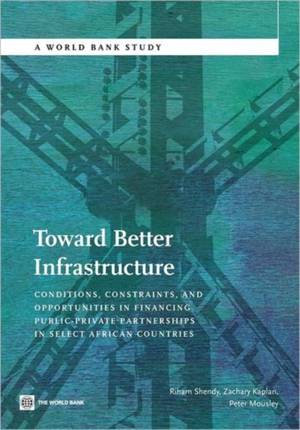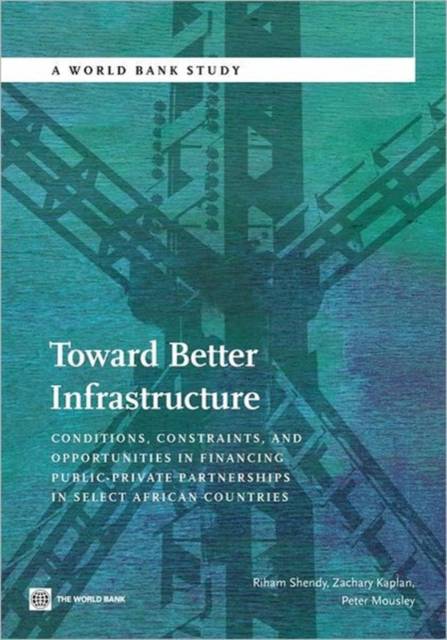
- Afhalen na 1 uur in een winkel met voorraad
- Gratis thuislevering in België vanaf € 30
- Ruim aanbod met 7 miljoen producten
- Afhalen na 1 uur in een winkel met voorraad
- Gratis thuislevering in België vanaf € 30
- Ruim aanbod met 7 miljoen producten
Zoeken
Toward Better Infrastructure
Conditions, Constraints, and Opportunities in Financing Public-Private Partnerships in Select African Countries
Riham Shendy, Zachary Kaplan, Peter Mousley
€ 25,45
+ 50 punten
Omschrijving
Examining innovative ways to address Africa's infrastructure deficit is at the heart of this analysis. Africa's infrastructure stock and quality is among the least developed in the world, a challenge that significantly hinders economic development. It is estimated that the finance required to raise infrastructure in Sub Saharan Africa (SSA) to a reasonable level within the next decade is at US$93 billion per year, with two-thirds of this amount needed for capital expenditures. With the existing spending on infrastructure being estimated at US$45 billion per annum and after accounting for potential efficiency gains that could amount to US$17 billion, Africa's infrastructure funding gap remains around US$31 billion a year. One approach to address this challenge is by facilitating the increase of private provision of public infrastructure services through public-private partnerships (PPPs). This approach, which is a relatively new arrangement in SSA is multifaceted and requires strong consensus and collaboration across both public and private sectors. There are several defined models of PPPs. Each type differs in terms of government participation levels, risk allocations, investment responsibilities, operational requirements, and incentives for operators. Our definition of PPPs assumes transactions where the private sector retains a considerable portion of commercial and financial risks associated with a project. In more descriptive terms, among the elements defining the notion of PPPs discussed in this study are: a long-term contract between a public and private sector party; the design, construction, financing, and operation of public infrastructure by the private sector; payment over the life of the PPP contract to the private sector party for the services delivered from the asset; and the facility remaining in public ownership or reverting to public sector ownership at the end of the PPP contract. The observations and policy recommendations that follow draw on ongoing World Bank Group PPP engagements in these countries, including extensive consultations with key public and private sector stakeholders involved in designing, financing, and implementing PPPs. The study is structured around the most inhibiting constraints to developing PPPs, as shared by all six countries.
Specificaties
Betrokkenen
- Auteur(s):
- Uitgeverij:
Inhoud
- Aantal bladzijden:
- 96
- Taal:
- Engels
- Reeks:
Eigenschappen
- Productcode (EAN):
- 9780821387818
- Verschijningsdatum:
- 6/07/2011
- Uitvoering:
- Paperback
- Formaat:
- Trade paperback (VS)
- Afmetingen:
- 173 mm x 246 mm
- Gewicht:
- 158 g

Alleen bij Standaard Boekhandel
+ 50 punten op je klantenkaart van Standaard Boekhandel
Beoordelingen
We publiceren alleen reviews die voldoen aan de voorwaarden voor reviews. Bekijk onze voorwaarden voor reviews.








